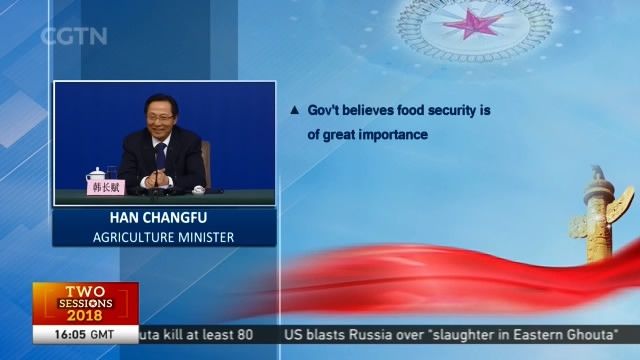
08:45, 08-Mar-2018
Today at the Two Sessions: Senior officials address finance, agriculture, poverty alleviation progress

Every evening over the next two weeks, we'll recap the most important developments of the day from the Two Sessions. Today, three press conferences -- regarding poverty alleviation and the sectors of finance and agriculture -- were held on the sidelines of the National People's Congress.
At a morning press conference, Finance Minister Xiao Jie answered questions about China's fiscal policy for the year ahead.
He said the policy would continue to be as proactive as it was in 2017. He projected that the government deficit would be just under 2.4 trillion yuan, and that China would increase its fiscal expenditure. The minister lowered China's fiscal deficit target for the year to 2.6 percent of GDP, due to the country's stable economic growth and increases in revenue. It would be the first drop in this area since 2013.
XIAO JIE CHINA'S MINISTER OF FINANCE "The debt rate of our government is lower than the internationally recognised alert line of 60 percent, and it is also lower than those of major economies and some emerging markets. We predict that in the next few years our government debt will not see obvious changes from 2017 levels."
Xiao said the ministry would increase its public spending by 7.6 percent, to 21 trillion yuan which would include a 30 billion yuan rise in central government investments in infrastructure. To facilitate the rise, the minister cited a 550-billion yuan increase in local government special bond issuances. Meanwhile, he said the ministry would reduce taxes on businesses and individuals by more than 800 billion yuan and lighten other fees on market entities by over 300 billion yuan.
Xiao said despite the increase in spending, China is confident of fully forestalling systemic risks.He said the Chinese government is paying close attention to managing its debt.
Finance Minister Xiao Jie -China raises budget for general public expenditures in 2018 to 21 trillion yuan On infrastructure: - 550-billion-yuan increase in local gov't special bond issuances - 30-billion-yuan rise in central gov't investments.
Liu Yongfu, director of the State Council's Leading Group Office for Poverty Alleviation and Development, took questions on China's targeted poverty alleviation policy. He said more than 120 poverty-stricken counties were brought above the poverty line last year adding that over the past 5 years, the population under the poverty line was reduced by about 68 million. About 30 million people still remain below the poverty line. Liu said rural areas in the west and southwest will get more support, adding that the government's goal is to eliminate absolute poverty in China by 2020.

SITEMAP
Copyright © 2018 CGTN. Beijing ICP prepared NO.16065310-3
Copyright © 2018 CGTN. Beijing ICP prepared NO.16065310-3